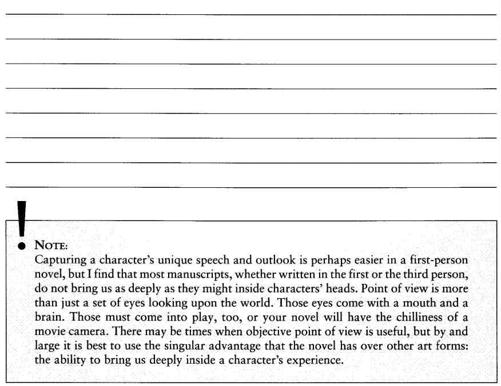Read Writing the Breakout Novel Workbook Online
Authors: Donald Maass
Writing the Breakout Novel Workbook (36 page)
Susan Wiggs uses a mother's view of her teenaged son in
The You I Never Knew,
discussed in earlier chapters, in the same way. Her novel's heroine, Michelle Turner, has returned to Crystal City, Montana, to donate a kidney to her father, and has brought along her Seattle-sophisticated son, Cody. When Cody gets interested in a local cowgirl, Michelle is relieved:
Good, she thought. Maybe he'd finally get over his obsession with Claudia Teller, his girlfriend since the start of the school year. Claudia was a beautiful pale predator who never met Michelle's eyes and who answered her admittedly chirpy questions with monosyllables. Claudia had introduced Cody to cigarettes and Zima, and probably to things Michelle hadn't found out about yet. There was no creature quite so intoxicating as a provocative teenage girl. And no creature quite so malleable as a teenage boy on hormone overload. A girl like Claudia could make Eagle Scouts steal from their grandmothers. She wore makeup with the brand name Urban Decay. She had bottle red hair and kohl-deepened eyes, and she was as seductive as Spanish fly on Cody's defenseless adolescent libido. The most popular girl in school, she wielded her power over him with casual ruthlessness.
Notice the damning details ("Urban Decay") and the hyperbolic language "seductive as Spanish fly" and "casual ruthlessness") that Wiggs uses to convey Michelle's sense of protectiveness toward her "defenseless" teenaged son. As we come to find out, Michelle's protectiveness derives in no small way from her own seduction at age eighteen by a handsome cowboy, Sam McPhee, who got her pregnant with Cody and whom she remeets, with life-changing consequences, in Crystal City.
Young adults have their own view of the world, especially the grown-up realm of work and corporations. They see its shallowness and money-chasing hypocrisy in a way, naturally, that no other generation before has seen. Since the time of Holden Caulfield, youth disaffection has been a staple of fiction. How, then, can a writer capture that disaffection in a way that reflects the discovery and outrage of each new generation?
In her striking debut,
Silk,
a dark urban fantasy, Caitlin R. Kiernan finds an original language with which to express the outsider point of view of the
marginal world of goths, post-punks, and the gay/lesbian community of Birmingham, Alabama, in the 1990s. One of the novel's twin protagonists is Daria Parker, songwriter and bassist for the local band Stiff Kitty. As the novel opens, Daria, on her way to rehearsal one early evening, regards Birmingham at quitting time and notes its mix of old and new:
Tailpipe farts and the gentle rev of engines made in Japan and Germany, the office monkeys calling it a day, reclaiming their cars from the parking garages spaced out along the length of Morris Avenue. Daria closed her eyes, exhaling slow smoke through her nostrils, listening to the bumpity sound of wheels on the polished unevenness of the street. Behind her, behind the offices, the sudden air horn blat and dinosaur herd rumble of a freight train, hurrying along one or another of the six tracks that divided downtown Birmingham into north and south.
Clearly this is not the vocabulary of an insider, of the "office monkeys." Kiernan's language not only anchors Daria's point of view, it also prepares us for a strange and scary tale of dread, dreams, and crawling terrors that may or may not come from the mind of goth/lesbian store owner Spyder Baxter, the novel's other protagonist. The urban underbelly and its horrors once belonged exclusively to novelist Poppy Z. Brite, but with strong point-of-view writing and a fine-tuned feeling for nameless dread that recalls Lovecraft, Bradbury, and King, Kiernan has taken a share of this territory for herself.
What sort of singing voice do you have? Soprano? Alto? Tenor? Bass? What kind of soprano—bright? What kind of tenor—high? Is your voice pop, smooth, operatic, or belting? The type of singing voice you have makes a difference to the sound that comes out of your mouth, correct?
So it is with your "voice" in your novel. What kind of voice is it, exactly? That will in large part be determined by your choice of point of view, but more than that by how you use that point of view. Are the voices of your characters ordinary and generic, or are they highly colored and specific? Heighten point of view throughout your manuscript, and you will strengthen your story's impact.
_________EXERCISE
Strengthening Point of View
Step 1: |
 |
Step 2:
On this page of the manuscript, select anything that the point-of-view character says, does, or thinks. Heighten it. Change the dialogue. Exaggerate the action. Grow the emotion, thought, or observation to make it even more characteristic of this character.

Follow-up work:
Turn to another page at random. Whose point of view is it now? Can you heighten anything.
Repeat the steps above once in every scene in your novel.

Conclusion:
What would happen if you actually did the follow-up exercise above, instead of just thinking about it? Your novel would take longer to write, but wouldn't it be stronger? When I pose this question in the workshops there are groans, but also nods of agreement. Weak point of view is a common failing of manuscripts; the cure is painstaking, page-by-page strengthening of point of view. Good news: The next exercise is a tool that might make the job easier.
Character Delineation
H
aving sharpened the points of view you have chosen for your novel, it is time to take the next step and make sure that your characters sound, act, and think differently from each other. That is the business of character delineation.
The
USA Today
best-seller list is a great place to spot breakout novelists, particularly those whose work appears as original paperbacks. One author who has made it to that list is Barbara Freethy. Novels like
One True Love, Some Kind of Wonderful,
and
Love Will Find a Way
established her as a storyteller with a gift for warm, family-oriented stories—usually with a primary romance, a secondary couple, and a long-held secret driving the plot.
In
Summer Secrets,
discussed in earlier chapters, Freethy takes her strengths several steps further. This time there are three women: Sisters, bound together by the secret of what happened on a round-the-world sailboat race that brought them fifteen minutes of fame, a winners' trophy, and a boatload of secrets. Among other things, Freethy faces the task of making these three sisters different from each other, and she does this effectively.
The oldest is Kate, protective, responsible, and understanding; as well as bossy, opinionated, and critical. She watches over their once-magnetic father, Duncan, now a land-locked alcoholic. Formerly a wild adventurer, Kate now is (well, perhaps) a play-it-safe bookstore owner on the island of Castleton in Puget Sound:
Kate loved her view of the waterfront—loved the one from her house in the hills even better—but more than anything she appreciated the fact that the view didn't change every day. Maybe some would call that boring, but she found it comforting.
The wind lifted the hair off the back of her neck, changing that feeling of comfort to one of uneasiness. Wind in her life had meant change. Her father, Duncan McKenna, a sailing man from the top of his head to the tips of his toes, always relished the wind's arrival. Kate could remember many a time when he had
jumped to his feet at the first hint of a breeze. A smile would spread across his weatherbeaten cheeks as he'd stand on the deck of their boat, pumping his fist triumphantly in the air, his eyes focused on the distant horizon.
The wind's up, Katie girl,
he'd say.
It's time to go.
And they'd go—wherever the wind took them. They'd sail with it, into it, against it. They'd lash out in anger when it blew too hard, then cry in frustration when it vanished completely. Her life had been formed, shaped, and controlled by the wind. She'd thought of it as a friend; she'd thought of it as a monster. Well, no more.
She had a home now, an address, a mailbox, a garden. She might live by the water, but she didn't live on it.
The middle sister, Ashley, now a photographer, is the most fragile. Since the race eight years earlier she has grown afraid of boats and the ocean, as we learn early in the novel when she tries to board a boat during a Castleton race week to snap a portrait of the crew:
Water splashed over the side of the dock, and she took a hasty step backward. She felt small and vulnerable on this bobbing piece of wood with a storm blowing in. The sea had often made her feel that way. Her father had always told her to look the ocean right in the eye, never back down, never give up, never give in. There was a time when those brave, fighting words had given her courage. Then she'd learned through hard experience that the ocean didn't back down or give in, either. That if it was man or woman against nature, nature would win.
The youngest is Caroline, a reckless young woman who smokes too much, drinks too hard, and flirts too easily. A hair stylist with piercings and a tattoo, she also is impulsive and rebellious. The contrast between the three is pronounced, and nicely summed up in one early moment when the three sisters contemplate whether or not to tell their father that their boat named Moon Dancer, sold years before, has now sailed back into Castleton's harbor—and with it the one man who knows the secret of what happened during the fateful race:
Once again, both sisters looked to Kate for the answer to their problem. They'd played out this scene many times before— Caroline eating chocolate, Ashley biting her fingernails while Kate paced.
The exercise underlying this chapter works toward creating a point-of-view vocabulary that will distinguish one character from another; however, it is not always necessary to be inside characters' heads to accomplish delineation.
In his best-selling literary novel
The Virgin Suicides,
Jeffrey Eugenides has five women to distinguish from one another: five suicidal teenage sisters ranging in age from thirteen to seventeen. Adding to this challenge, Eugenides's novel is narrated by an outside observer, a narrator who speaks with one voice for the whole puzzled Michigan town where the suicidal sisters live and die. Moreover, this narrator's point of view is almost wholly objective.